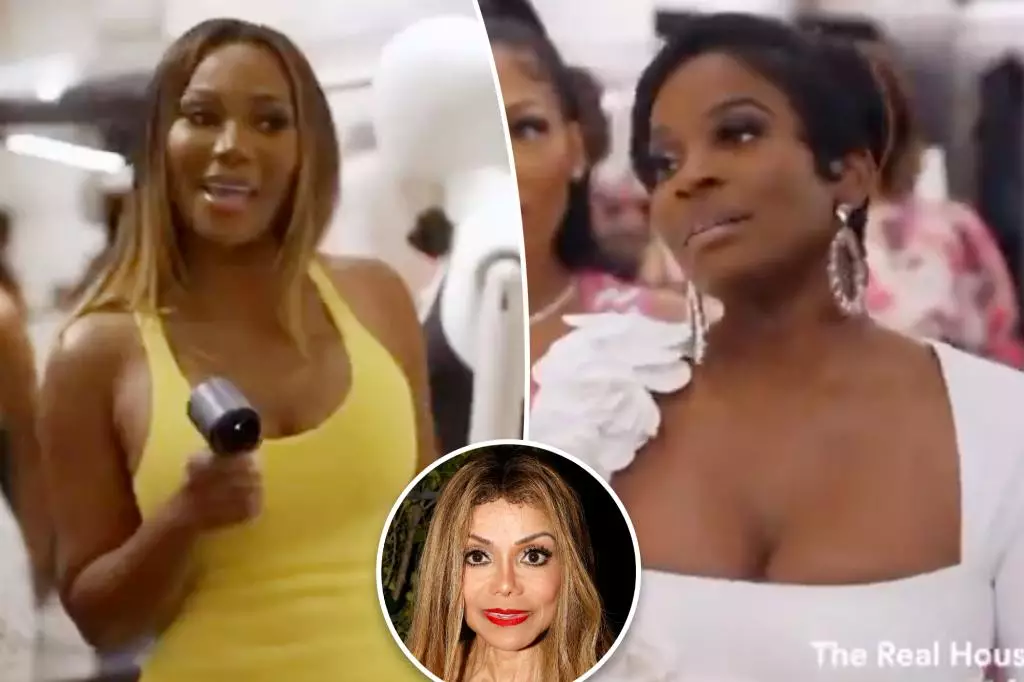The realm of reality television is notorious for its explosive confrontations, and “The Real Housewives of Atlanta” epitomizes this chaotic spectacle. The latest episode showcased a spectacular clash between Shamea Morton and Angela Oakley, two cast members who appear unable to navigate their differences maturely. Morton walked into the scene like a proverbial bull in a china shop, ready to unleash her fiery spirit. At Kelli Ferrell’s “Mommy and Me” charity event—a seemingly benign backdrop—tensions bubbled over, revealing an undercurrent of rivalry that speaks volumes about personal agendas within the cast.
Instead of an olive branch, Oakley attempted a dialogue, broaching the hope of reconciliation and suggesting that their previous altercation was grounded in misunderstandings. However, Morton quickly derailed the conversation by throwing shade at Oakley’s association with Drew Sidora, implying that Oakley is merely a pawn and not capable of voicing her own opinions. The lack of sincerity in these exchanges raises an eyebrow; is this a genuine attempt to mend fences, or simply a setup for another verbal sparring match?
Insults as Entertainment
What followed was a masterclass in the art of shade-throwing. Morton, armed with her sharp tongue, quickly reverted to mocking Oakley’s appearance. The reference to Oakley’s “’99 nose” was not merely a jab at her aesthetics but a clever tactic to remind audiences of the superficiality that often permeates reality TV. Oakley retaliated with a quip aimed at Morton’s loyalty to her friend Porsha Williams, which further intensified their exchange. Herein lies the problem: instead of genuine conflict resolution, we observe a toxic back-and-forth that seems to glorify petty insults rather than promote personal growth.
The verbal sparring draws us in because it feels real; the characters seem uninhibited and relate to an audience that likely appreciates the authenticity of conflict—even if it derives from insecurities. Thus, the show’s success hinges on such tumultuous confrontations, where insults transform into entertainment, underscoring a reality that many viewers might identify with but likely choose to avoid in their personal lives.
The Cultural Reflection of Reality TV
This interlude of drama reflects not only personal rivalries but also broader societal issues, such as the obsession with physical appearance and social standings. The digs about plastic surgery and facades reveal underlying insecurities that permeate the RHOP universe—where worth is often equated with beauty and alliance. The comparison of Morton to Flavor Flav and Oakley’s frivolous insults provide glimpses into the deeper narratives of insecurity, power dynamics, and the need to be validated through external appearances and friendships.
Engaging with these characters, viewers are invited to contemplate their own relationships and societal expectations. Are we, as audiences, reinforcing harmful norms by indulging in these shenanigans? As Morton and Oakley clash, the messy reality of humanness unfolds, creating a stage where audiences reflect on their values even amidst the chaos.
In sum, the latest episode of “The Real Housewives of Atlanta” unveils the riveting layers of human interaction, transcending simple entertainment and prompting viewers to ponder their reflections in the mirror of reality.

